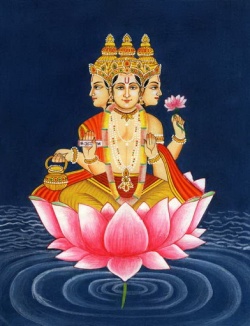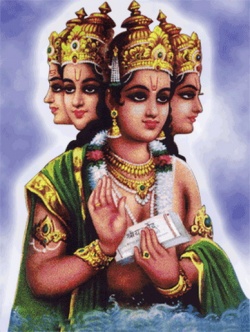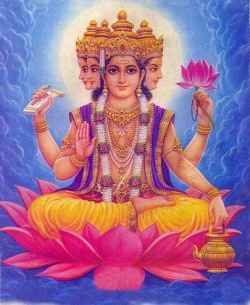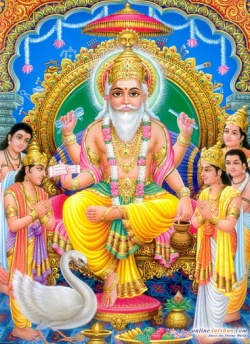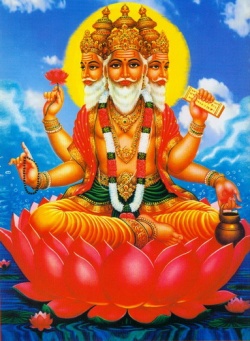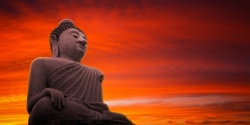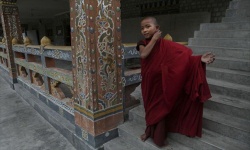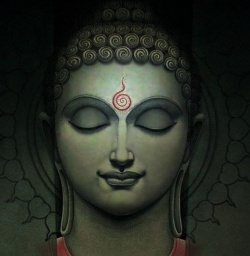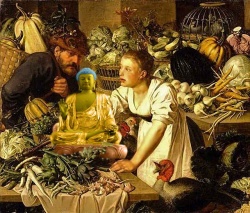Brahma
Click here to see other articles relating to word Brahma
Brahmā (梵) in Buddhism is the name for a type of exalted passionless deity (Deva), of which there are several in Buddhist cosmology.
Especially the Mahayana Lotus Sutra, chapter 7 makes mention of several "Brahma gods".
Origins
The name Brahmā originates in Vedic tradition, in which Brahmā appears as the creator of The Universe.
By contrast, early Buddhist texts describe several different Brahmās coexisting in the same Universe; some of them think they are "all powerful" creators of the World, but they are corrected by The Buddha.
The myths, characters, and functions of these Brahmās are distinct from those of the Vedic Brahmā.
However, at least one of the Buddhist Brahmās is identified as being the object of worship of pre-Buddhist brahmins.
The Buddha described the Vedic Brahmā as a misunderstanding, or mistaken remembrance, of one or more of the Buddhist Brahmās, as explained in the Brahmajāla-Sutta (Digha Nikaya 1).
There is no identity between the Buddhist Brahmās and the Hindu conception of Brahman as an all-encompassing divine force.
Classification
There are at least four ways of interpreting the term Brahmā (Japanese: 梵天 Bonten).
It may refer to:
- Any of the deities of the Ārūpyadhātu or of the Rūpadhātu
- Any of the deities of the nine lowest worlds of the Rūpadhātu, from Śubhakṛtsna to Brahmapāriṣadya.
- Any of the deities of the three lowest worlds of the Rūpadhātu
- A Mahābrahmā, one of the highest deities of preceding group.
In the sense of "a being of the Rūpadhātu", the term Brahmā may be related to Brahmavihāra, a term referring to the Meditative states achieved through the four Rūpajhānas, which are shared by the inhabitants of the Rūpadhātu.
Individual Brahmās
Several Brahmās are named in the Buddhist texts.
In Light of the ambiguity of the term "Brahmā", there is often some uncertainty about how to place these individuals within the cosmological context.
In terms of the texts where they appear, they either are presented as figures of authority or as characters with an exaggerated sense of their own importance.
Baka Brahmā
Baka Brahmā (literally "crane-Brahmā") appears in the Majjhima Nikaya, where he is a deity who believes that his World is permanent and without decay (and that therefore he is immortal), and that therefore there are no higher worlds than his.
The Buddha refutes Baka's claims, relating the concept of anitya or Impermanence, but one of Baka's attendants (influenced by Māra) asserts that Baka is the Creator, that those who praise him will be rewarded, but those who deny his powers will be terribly punished.
The Buddha identifies the real speaker as Māra, and states that he is free of his Power.
Baka then states that it is futile to escape his domain (which he imagines to be universal), and points out that if The Buddha depends upon any of the things within Baka's cognizance, he will be within his realm, and Baka can act upon him as he sees fit.
The Buddha responds that Baka does have this much Power, but that there are realms which Baka knows nothing of, and that The Buddha's Knowledge places him beyond Baka's Power.
Baka is at last convinced by a display of The Buddha's superior magical Power and his ability to explain his present situation by reference to his past lives.
Baka was in a past Life a human Ascetic named Kesava; by various means he saved many people from destruction.
For his Meditative prowess he was born as a Bṛhatphala Deva, and in successive rebirths gradually sank through the levels of the Rūpadhātu until he became an ordinary Brahmā.
On another occasion, Baka believes that no Monk or Ascetic can enter his World (through supramundane powers of manifestation), but The Buddha himself and several of his disciples visit him to prove him wrong.
Baka Brahma appears in the Bakabrahma-Sutta and the Brahmanimantanika-Sutta.
Brahmā Sahampati
Brahmā Sahampati, said to be the most senior of the Mahābrahmās, was the deity who invisibly attended on The Buddha when he attained Enlightenment, and when The Buddha was meditating at Uruvelā afterwards, encouraged him to teach the Dharma to humans.
According to some commentaries he was an Anagami (Non-returner), one of the Śuddhāvāsa (Pure Abodes) deities.
He was the Rebirth of a Monk named Sahaka, who had been in the Saṅgha of Kāśyapa Buddha.
On one occasion, he encouraged a woman whose son was a bhikṣu not to make offerings to Brahmā, but instead to give alms to her son (who coincidentally was named Brahmadeva).
The Saṃyutta Nikāya contains verses said to have been spoken by [[Brahm] Sahampati]], when he, together with Śakra, attended on The Buddha.
He also attended upon The Buddha at his Death, and verses attributed to him are included in the Mahāparinibbāna-Sutta.
Of all the Brahmās he seems to have been the closest to The Buddha.
Brahmā Sanatkumāra
Brahmā Sanatkumāra (Sanskrit) or Brahmā Sanaṅkumāra (Pāli), the "Ever-young", appears in the Janavasabha-Sutta (DN.18), where he is recalled as having created an illusionary presence to make himself perceptible to the coarser senses of Śakra and the gods of Trāyastriṃśa.
He addressed these deities, in such a way that each of them Thought that he was being spoken to alone, and advised them to follow The Precepts and practices of The Buddha, and explained the good results that would come from such practice.
Commentators explained the Epithet of "Ever-young" by saying that he had chosen the appearance of a very young man, whose Hair was still tied up in the adolescent style of five knots.
Mahābrahmā
The name Mahābrahmā, more of a title than a name, appears in several suttas. It properly belongs to the deity or deities of the third World of the Rūpadhātu, but may be used for even higher deities.
A Mahābrahmā's titles are: "Brahmā, Great Brahmā, the Conqueror, the Unconquered, the All-Seeing, All-Powerful, the Lord, the Maker and Creator, the Ruler, Appointer and Orderer, Father of All That Have Been and Shall Be."
According to the Brahmajāla Sutta (DN.1), a Mahābrahmā is a being from the Ābhāsvara worlds who falls into a lower World through exhaustion of his merits and is reborn alone in the Brahma-World;
forgetting his former existence, he imagines himself to have come into existence without cause.
Beings who have been reborn from his World into the human World and are able to gain a memory of it, believe him to be the creator of the World.
In the Kevaddha-Sutta (DN.11), a Mahābrahmā is unable to answer a philosophical question addressed to him by a Monk, but conceals this fact from the devas of his retinue so as not to lose face in front of them.
Addressing that Monk privately, he tells him to ask his question of The Buddha.
Brahma gods
Buddhist scriptures also tell about "Brahma gods" (梵天).
They are gods who have only pure desires, and reside in the Brahma World (brahma-loka, in Vedas there are also two brahmalokas;
- material, planet of Lord Brahma, usually known as Satyaloka, and
eternal - "brahmaloka sanatana" - abode of Vishnu), i.e., all heavens in the form realm or the first of its four dhyāna heavens.
The first dhyāna heaven)] comprises three heavens:
- Brahma Multitude (Brahma-pāriṣadya),
- Brahma Minister (Brahma-purohita), and
- Great Brahmā (Mahābrahmā).
The Brahma-king Śikhin, assisted by his ministers, rules all Brahma gods in these three heavens (eighteen heavens in the form realm).
Non-Buddhist views refuted in early texts
The old Upanishads largely consider Brahman in the masculine Gender (Brahmā in the nominative case, henceforth "Brahmā") to be a personal God, and Brahman in the neuter Gender (Brahma in the nominative case, henceforth "Brahman") to be the impersonal World principle.
They do not strictly distinguish between the two, however.
The old Upanishads ascribe these characteristics to Brahmā:
first, he has Light and luster as his marks; second, he is invisible; third, he is unknowable, and it is impossible to know his nature; fourth, he is omniscient.
The old Upanishads ascribe these characteristics to Brahman as well.
In the Buddhist texts, there are many Brahmās.
There they Form a class of superhuman beings, and Rebirth into the realm of Brahmās is possible by pursuing Buddhist practices.
In the early texts, The Buddha gives arguments to refute the existence of a creator.
In the Pāli scriptures, the neuter Brahman does not appear (though the word Brahma is standardly used in compound words to mean "best", or "supreme" ), however ideas are mentioned as held by various Brahmins in connection with Brahmā that match exactly with the concept of Brahman in the Upanishads.
Brahmins who appear in the Tevijja-suttanta of the Digha Nikaya regard "union with Brahmā" as Liberation, and earnestly seek it.
In that text, Brahmins of the time are reported to assert:
"Truly every Brahmin versed in the three Vedas has said thus:
We shall expound the Path for the sake of union with that which we do not know and do not see.
This is the correct Path. This Path is the Truth, and leads to Liberation.
If one practices it, he shall be able to enter into association with Brahmā."
The early Upanishads frequently expound "association with Brahmā", and "that which we do not know and do not see" matches exactly with the early Upanishadic Brahman.
In the earliest Upanishad, the Brihadaranyaka Upanishad, the Absolute, which came to be referred to as Brahman, is referred to as "the imperishable".
The Pāli scriptures present a "pernicious view" that is set up as an absolute principle corresponding to Brahman: "O Bhikkhus! At that time Baka, the Brahmā, produced the following pernicious view: 'It is permanent.
It is eternal.
It is always existent. It is independent existence.
It has the Dharma of non-perishing. Truly it is not born, does not become old, does not die, does not disappear, and is not born again.
Furthermore, no Liberation superior to it exists elsewhere."
The principle expounded here corresponds to the concept of Brahman laid out in the Upanishads.
According to this text The Buddha criticized this notion: "Truly the Baka Brahmā is covered with unwisdom."
The Buddha confined himself to what is empirically given.
This empiricism is based broadly on both ordinary sense experience and extrasensory Perception enabled by high degrees of Mental Concentration.
(However it should be noted that amongst the customary epithets of the Buddha are the Pali terms 'lokuttara', meaning 'world-transcending', and also 'lokavidu', meaning 'knower of worlds' which are both quite incompatible with the notion of 'empiricism' as generally understood in current philoosphy.)
Source
Brahma (Tib. ཚངས་པ་ ) is one of the principal gods in the Indian pantheon.
He is considered to epitomize the energy of life, light, and growth, and to actually be all things and all beings.
His body is constituted by the fifty sacred seed syllables of the divine language of perfection, Sanskrit.
Brahma is not at all destructive, unlike Shiva and Indra, who are capable of great destruction and violence, but is the essence of creativity.
There are said to be four abodes of Brahma, or Brahma realms;
joy and
Also Brahma was the first to appear after Buddha Shakyamuni attained enlightenment, with an offering of a thousand-spoked golden wheel, requesting him to turn the teaching wheel of the dharma.[2]
Footnotes
- ↑ The Central Philosophy of Tibet, Robert A. F. Thurman, published by Princeton University Press, ISBN 691 02067 1
- ↑ The Encyclopaedia of Tibetan Symbols and Motifs, Robert Beer, published by Serindia Publications, ISBN 1 932476 10 5
See Also
Source
Brahma
梵天 (Skt, Pali; Jpn Bonten)
Also, Mahabrahma, the great heavenly king Brahma, or the heavenly king Brahma.
A god said to live in the first and lowest of the four meditation heavens in the world of form above Mount Sumeru and who rules over the saha world.
In Indian mythology, he was regarded as the personification of the fundamental universal principle (Brahman), and he was incorporated into Buddhism as one of the two major tutelary gods, the other being Shakra, known also as Indra.
Source
Brahmā (梵). Purity, or freedom from Desire. It is deified in Hinduism as the Creator.
The Brahma way of Life in the Desire realm is Celibacy.
Source
Brahma: An ambiguous term used in Buddhism to mean different beings–either all of a certain class of devas or as a term for Mahabrahma, the king of that devic realm.
The Hindu religion has Brahma as the god of creation and uses the term Brahman to describe the Supreme Cosmic Spirit, but this being is not recognized as such by Buddhists who do not believe in any form of “creator god” since all “created” or conditioned phenomena is the natural result of karma.
Source
Brahma (Brahmā) Also called Mahabrahman (Mahābrahman). An Indian deity regarded as the personification of the fundamental universal principle.
In Buddhism he was adopted as a protective deity.
He lives in the first of the four meditation heavens in the world of form above Mount Sumeru and rules the saha world.
Brahma (Brahmā) king , King of the Brahma heaven, a deity who has attained supremacy in a particular world.
In the Lotus Sutra a great number of Brahma kings appear.
Brahma (tshangs pa). The ruler of the gods of the Realm of Form.
Source
